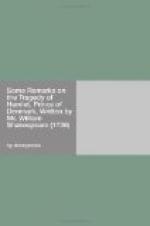Criticism in general, is what few of our Countrymen have succeeded in: In that respect, our Neighbours have got the better of us; altho’ we can justly boast of the compleatest Essay on that Subject that has been publish’d in any Language, in which almost every Line, and every Word, convey such Images, and such Beauties, as were never before found in so small a Compass, and of whose Author it may properly be said, in that respect,_
He is himself that great Sublime he draws.
I would not have the Reader imagine, that I believe I have pointed out all the Excellencies in this Tragedy; I am not so vain as to think so. Besides, these Papers are too few to contain them; and I have so little of Presumption in me, that I did not think it reasonable to put my Readers to a greater Expence, by enlarging on the Subject, until I find that they themselves are not averse to it.
This is all I have to say at present; whatever else is necessary to premise, will be found in the Introduction to the Remarks, to which I refer.
* * * * *
SOME REMARKS ON THE TRAGEDY OF
Hamlet Prince of Denmark.
I am going to do what to some may appear extravagant, but by those of a true Taste in Works of Genius will be approv’d of. I intend to examine one of the Pieces of the greatest Tragick Writer that ever liv’d, (except Sophocles and Euripides,) according to the Rules of Reason and Nature, without having any regard to those Rules established by Arbitrary Dogmatising Criticks, only as they can be brought to bear that Test.
Among the many Parts of this great Poet’s Character, so often given by some of our best Writers, I shall particularly dwell upon those which they have the least insisted on, which will, however, put every Thing he has produc’d in its true and proper Light.
He had (beyond Dispute) a most unbounded Genius, very little regulated by Art.
His particular Excellency consists in the Variety and Singularity of his Characters, and in the constant Conformity of each Character to it self from its very first setting out in the Play, quite to the End. And still further, no Poet ever came up to him, in the Nobleness and Sublimity of Thought, so frequent in his Tragedies, and all express’d with the most Energick Comprehensiveness of Diction.
And it must moreover be observed, as to his Characters, that although there are some entirely of his own Invention, and such as none but so great a Genius could invent; yet he is so remarkably happy in following of Nature, that (if I may so express it) he does it even in Characters which are not in Nature. To clear up this Paradox, my Meaning is, that if we can but once suppose such Characters to exist, then we must allow they must think and act exactly as he has described them.




